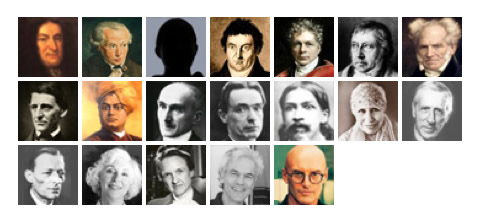
Andrew Cohen used to be a popular Hindu guru. Still a popular guru, he now describes himself as in the lineage of 19th Century German Romantic Idealist philosophy. What does this tell us about the dynamics of the religious marketplace, and the development of pop spirituality?
I was startled a year or so ago to find that the front page of his web site prominently featured rows of pictures of European philosophers. This seemed a bold and unexpected move.
Setting aside questions about his spiritual or personal merit, he is an exceptionally savvy marking guy, and successful religious entrepreneur. His magazine EnlightenNext (formerly What is Enlightenment?) has wide circulation, and he is at the forefront in using internet technology for promotion. He must think hard and often about how to position his offering in the spiritual supermarket.
German university professors from 1810 are not sexy. As a marketing guy myself, I wouldn’t dream of associating any product with them.
So one interpretation of Cohen’s acknowledgement of them is as brave and honest. Having discovered that what he teaches has more in common with Hegel than Ramana Maharishi, he decided to say so, and damn the consequences for his market share. If so, I would find that admirable.
Some time later, he moved the German philosophers off to a less-prominent “Historical Context” page. Not everything can be on the front page at once, so there is nothing wrong with that. It does raise the question, though, of whether this was an experiment that failed. And if so, what was the experiment testing, and why did it fail?
Hindu gurus were popular in America in the 1960’s through 80’s. They seem to have little appeal now. That is probably partly due to better understanding by Americans of what Hinduism offers. Although some of the abstract philosophy is attractive, the religious specifics may be repellent to most.
But I suspect it also reflects a generational change. American Baby Boomers grew up within a coherent system of meaning. Many rejected that system, and looked for alternatives. Eastern religions made sense as comparable coherent systems.
Many in the younger generations do not want systems of any sort. As I have explained elsewhere in detail, Eastern religions seem to have run their course in the West. They are losing market share to “spiritual but not religious.”
So it is possible that Cohen was testing to see whether dissociating himself from Hinduism, and adopting new Western roots, would make a more attractive package. If so, my guess is the answer was “no.” That would be partly because the German Romantic Idealists are inherently unattractive, and partly because they were mostly also big on systems.
Here’s something I would very much like to know, but do not know how to find out. To what extent are Andrew Cohen, and his collaborator Ken Wilber, responsible for what I am calling “contemporary pop spirituality”?
I will suggest shortly that key features of contemporary pop spirituality are monism, eternalism, and system-freeness. Ken Wilber is a system-builder on steroids, in the style of Kant and Hegel (whom he explicitly admires).1 That means that he cannot be directly responsible for contemporary system-freeness. However, it seems likely that his elaborate intellectual framework has influenced the influencers; that he is the theoretician many pop teachers rely on, while dropping his jargon, complexity, and subtlety.
Cohen seems less systematic and more “pop.” His role may have been as one of the primary translators of Wilber’s ideas. His EnlightenNext media productions reach a great many people. But (without knowing much about his work), it appears that he’s enough of a systematizer that he too probably isn’t directly responsible for the pop-spirituality break-out.
- 1.Wilber at least partly understands the problems with monism and eternalism, and wants to find the resolutions of monism and dualism, eternalism and nihilism. I don’t know his work well, but I haven’t seen that he has done so. In any case, if aspects of his work have made their way into our contemporary thought soup, it is in a simplified form that misses that resolution.
